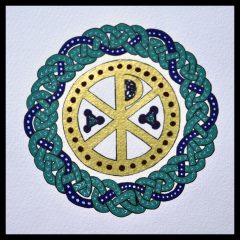For a printable copy of this chapter (7) click here: 8.5×11″; A4 paper
Click here for a pdf of Genesis 4–11 in Redemptive History: 8.5×11″; A4 paper
.
.
b) Gen 7:21–24: This passage describes the fulfillment of Gen 6:7, 17 and Gen 7:4.
Moses wrote, “And all of flesh died: that which creeps on the earth, birds, and animals, and every living thing on all of the earth which swarms on the earth, and all of humanity.”
He listed each of these types of creatures in the order in which God created them, including people (Gen 1:20–26).[1]
However, he omitted marine creatures, writing, “All flesh which [had] the breath of the spirit of life in its nostrils, all which [was] on dry ground, died. And he blotted out all that existed which was on the face of the earth, from humanity to animals to creeping things to birds of the heavens. And they were blotted out from the earth.”
Enuma Elish, a Babylonian creation story, depicts the god Marduk using a storm to defeat the evil water goddess Tiamat.
It says:
In front of him he set the lightning, with a blazing flame he filled his body…The four winds he stationed that nothing of her might escape. The South Wind, the North Wind, the East Wind, the West Wind…He brought forth…“the Evil Wind,” the Whirl-wind, the Hurricane, the Fourfold Wind, the Sevenfold Wind, the Cyclone, the Matchless Wind.
Then he sent forth the winds he had brought forth, the seven of them. To stir up the inside of Tiamat they rose up behind him. Then the lord raised up the flood-storm, his mighty weapon. He mounted the storm-chariot irresistible [and] terrifying.[2]
Consistent with the biblical text, people in the Ancient Near East (ANE) recognized floods as a means for the gods to destroy the wicked.
.
.
Moses continued, “However, Noah was left and those with him in the ark.”
In contrast to the condemned ones who were blotted out (makhah), Noah and his passengers were left behind (shāar).[3] Both of these verbs occur in the passive tense,[4] amplifying that the Lord controlled their fate (Cf. Gen 2:7).[5]
The same waters which rendered divine judgment preserved a righteous remnant.[6] Noah was delivered, for God chose him. His family was saved due to their relationship with the Lord.[7]
Jewish scholars recognized Noah as the supreme example of a righteous remnant whom God preserved while everyone else faced judgment.[8]
For example, a second century BC text states, “Noah was found perfect and righteous; in the time of wrath he was taken in exchange; therefore a remnant was left to the earth when the flood came. Everlasting covenants were made with him that all flesh should not be blotted out by a flood” (Sirach 44:17–18, RSVCE).
.
.
This chapter in Genesis concludes by saying, “The waters prevailed upon the earth [for] 150 days.”
The planet reverted to the form which existed when the waters of the great deep covered everything (Gen 1:1–2, 9).[9]
By the time the waters receded, Noah and his fellow passengers would spend one year on the ark (Gen 7:11; Gen 8:14–16).[10]
No other ANE flood account mentions the duration of the deluge.[11]
Image via Wikimedia Commons
.
Read Gen 7:21–24. What is the significance of the order Moses chose to list who perished? Who survived? How does this text indicate that the Lord reversed what he created? Does this passage encourage or discourage you? Why?
.
.
.
.
.
Go to Faithful and True (Rev 19:11)
[Related posts include In the Beginning of God’s Creating (Gen 1:1–2); God Separates the Waters (Gen 1:6–8); Inhabitants of the Sea and Sky (Gen 1:20–23); Living Things from the Earth (Gen 1:24–25); Made in the Image of God (Gen 1:26 cont.); The Lord Breathes Life (Gen 2:7); Wiping Out Everyone (Gen 6:7); A Reversal of Creation (Gen 7:5–16); The Waters Prevail (Gen 7:17–20); God Reverses the Flood (Gen 8:2–5); Renewal of the Earth (Gen 8:6–14); Not Knowing the Day or the Hour (Matt 24:36); As in the Days of Noah (Matt 24:37–39); One Will Be Left (Matt 24:40–41); The Day of the Lord Will Come (2 Pet 3:10); Ancient Literature; and Author and Date of Genesis]
[Click here to go to Chapter 7: God Opens the Heavens and the Earth (Genesis 7:1–24)]
.
[1]Wenham, Genesis 1–15, 183.
[2]Speiser, trans., “Enuma Elish (The Creation Epic),” in ANET, 4:39–50, 66, https://archive.org/stream/Pritchard1950ANET_20160815/Pritchard_1950_ANET#page/n91/mode/2up.
[3]Hamilton, The Book of Genesis, Chapters 1–17, 297.
[4] Brown, Driver, and Briggs, “םָחָה” (makhah), BDB, 562, https://archive.org/stream/hebrewenglishlex00browuoft#page/562/mode/2up. This verb appears twice in this verse: first in an active form; then passively.
[5]Hamilton, The Book of Genesis, Chapters 1–17, 297.
[6]Waltke and Fredricks, Genesis: A Commentary, 140.
[7]Hamilton, The Book of Genesis, Chapters 1–17, 298.
[8]R. E. Clements, “שָׁאַר” (shaar), TDOT 14:272–86, 276.
[9]Wenham, Genesis 1–15, 183.
[10]Walton, Genesis, 314.
[11]Kitchen, On the Reliability of the Old Testament, 425.
